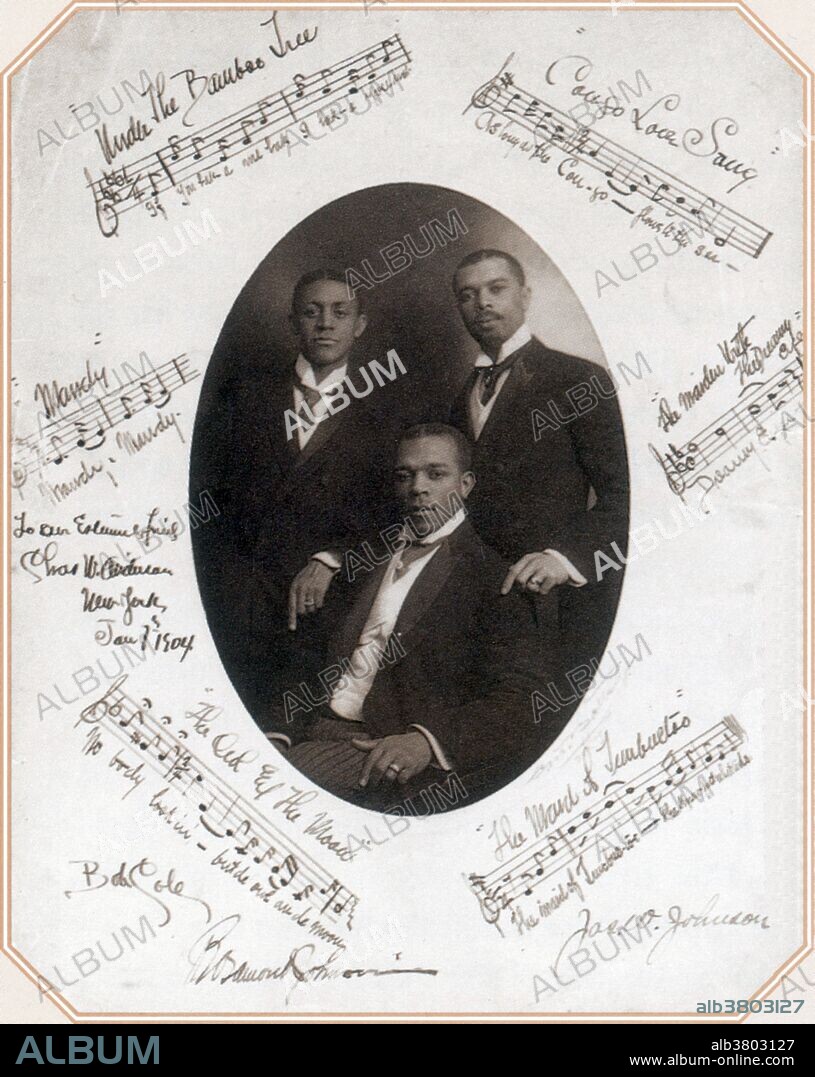alb3803127
Those Ebony Offenbachs, Johnson Brothers and Cole

|
Zu einem anderen Lightbox hinzufügen |
|
Zu einem anderen Lightbox hinzufügen |



Haben Sie bereits ein Konto? Anmelden
Sie haben kein Konto? Registrieren
Dieses Bild kaufen.
Nutzung auswählen:

Titel:
Those Ebony Offenbachs, Johnson Brothers and Cole
Untertitel:
Siehe automatische Übersetzung
James Weldon Johnson is seen here with his brother, Rosamond and their friend Robert Cole. They wrote music and lyrics for Broadway shows and were called "Those Ebony Offenbachs". James Weldon Johnson (June 17, 1871 - June 26, 1938) was an African-American author, politician, diplomat, critic, journalist, poet, anthologist, educator, lawyer, songwriter, and early civil rights activist. He is remembered best for his leadership within the NAACP, as well as for his writing, which includes novels, poems, and collections of folklore. He was also one of the first African-American professors at New York University. Following the flourishing of the Harlem Renaissance in the 1920s, Johnson compiled an anthology of poetry by black writers, The Book of American Negro Poetry, published in 1931. This established the African-American poetic tradition for a much wider audience, also inspiring younger poets. In 1930, he published a sociological study, Black Manhattan. (1930) His Negro Americans, What Now? (1934), was a book-length address advocating fuller civil rights for African Americans. He died in 1938, at the age of 67, while vacationing in Maine, when the car he was driving was hit by a train. His funeral in Harlem was attended by more than 2000 people.
Persönlichkeiten:
Bildnachweis:
Album / Science Source / New York Public Library
Freigaben (Releases):
Model: Nein - Eigentum: Nein
Rechtefragen?
Rechtefragen?
Bildgröße:
2700 x 3394 px | 26.2 MB
Druckgröße:
22.9 x 28.7 cm | 9.0 x 11.3 in (300 dpi)
Schlüsselwörter:
AMERIKANER • BERÜHMT • BERÜHMTE PERSÖNLICHKEIT • BOTSCHAFTER • DIPLOMAT • ERZIEHER • ERZIEHERIN • FARBIGER • GESANDTER • JAMES JOHNSON • KOMPONIST ALLE • KOMPONIST • MANN • MUSIKER: SAENGER • MUSIKSCHRIFTSTELLER • NOTABEL • PERFORMER • PERSON • PERSöNLICHKEITEN • PERSÖNLICHKEITEN • PORTRAIT • PROMINENZ • SAENGER • SÄNGER • SÄNGERIN
 Pinterest
Pinterest Twitter
Twitter Facebook
Facebook Link kopieren
Link kopieren Email
Email
